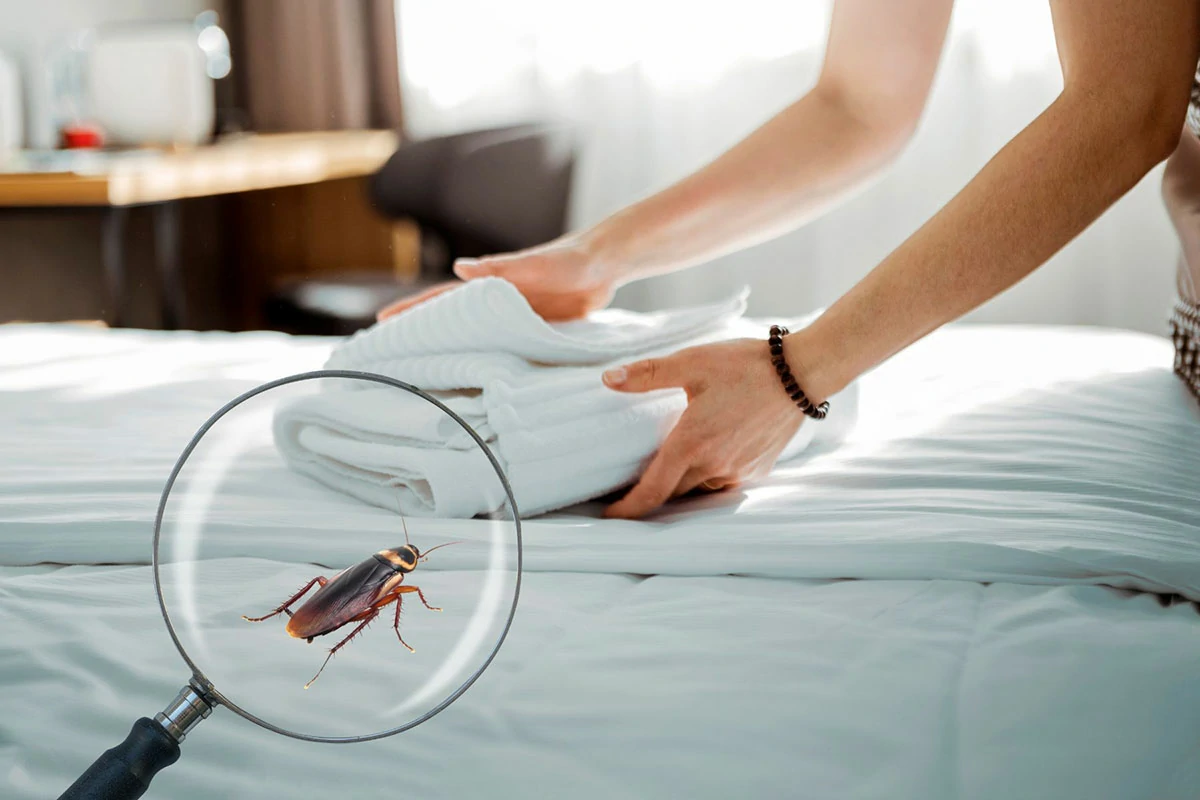Can You Get A Refund If Your Hotel Has Roaches? Answer is – Yes, you may be entitled to a refund if your hotel room has a roach infestation. The extent of the refund (full or partial) and your eligibility will depend on several factors, including:
- The hotel’s refund policy: Check for any specific clauses regarding pests or room conditions.
- The severity of the infestation: A few isolated roaches may be treated differently than a widespread issue.
- Your actions upon discovery: It’s essential to report the problem to hotel management promptly.
- Local consumer protection laws: These laws may provide additional rights and remedies.
Summary
- Finding roaches in your hotel room can ruin your stay and pose health risks.
- You might be eligible for a refund depending on the hotel’s policies and the severity of the issue.
- Documenting the infestation with photos or videos is crucial.
- Understanding your rights under consumer protection laws can strengthen your case.
- Taking steps to negotiate a refund or compensation is vital if the hotel is uncooperative.
Can You Get a Refund If Your Hotel Has Roaches?

Discovering pests in your hotel room can be a nightmare scenario. The shock and disgust can quickly overshadow any plans for relaxation or enjoyment. Roaches, in particular, are unwelcome guests – not just for their unsettling appearance but also for the potential health risks they carry. While hotels strive to maintain hygienic standards, infestations can unfortunately occur.
As a guest, it’s essential to be aware of your rights if you encounter a pest problem in your hotel room. Understanding the hotel’s responsibility and the actions you can take can help you advocate for a fair resolution and protect your well-being during your stay. It’s important to note that specific laws and regulations regarding hotel infestations may vary by location, so it’s always advisable to research local consumer protection guidelines.
The Unpleasant Reality of Hotel Pest Infestations
Even reputable hotels are not immune to pest infestations. Factors like high guest turnover, luggage brought in from various locations, and food preparation areas can contribute to the risk.
Roaches are particularly problematic due to their resilience, ability to reproduce quickly, and potential to carry allergens and pathogens.
The Importance of Knowing Your Rights as a Guest
When you book a hotel room, there’s an implicit expectation of cleanliness and habitability. Most hotels aim to provide a comfortable and pest-free environment for their guests.
If a roach infestation compromises the quality of your stay, you have the right to address the issue with hotel management and potentially seek a refund or compensation.
Documenting the situation and understanding your local consumer protection laws will strengthen your position when advocating for yourself.
Can You Get a Refund If Your Hotel Has Roaches?

The short answer is yes, you may be entitled to a refund if you discover a roach infestation in your hotel room.
However, the extent of the potential refund and the ease of obtaining it will depend on the following factors:
1. Factors Influencing Refund Eligibility
Hotel Policies
Before booking, check the hotel’s cancellation and refund policy. Some hotels may have specific clauses outlining their procedures for handling pest complaints or unsatisfactory room conditions.
It’s vital to familiarize yourself with these terms to understand what the hotel might be obligated to do.
Severity of Infestation
The scale of the problem matters. A single roach sighting might be treated differently than evidence of a widespread infestation.
If you find multiple roaches, or signs of an established colony (droppings, egg cases), this strengthens your case for a refund.
Consumer Protection Laws
Your location plays a significant role. Research local consumer protection laws that may govern hotel accommodations.
These laws can provide specific rights and remedies, such as the implied warranty of habitability, which means the room should be fit for its intended use.
You can usually find this information on the websites of government agencies focused on consumer affairs.
What to Do If You Find Roaches in Your Hotel Room

Discovering roaches in your hotel room can understandably cause alarm and frustration. However, acting promptly and strategically can increase your chances of a satisfactory resolution.
Here’s what to do:
1. Document the Evidence (photos, videos)
Before alerting hotel management, gather clear evidence of the infestation. Use your phone’s camera to take photos and videos of:
- Live roaches, with close-ups if possible
- Roach droppings (small, dark specks)
- Egg cases (may look like small brown beans)
This documentation will be crucial to support your case when you discuss the issue with the hotel.
2. Notify Hotel Management Immediately
Don’t delay informing the hotel about the problem. Contact the front desk or speak with a manager in person. Describe the roach infestation calmly and clearly.
Show them the photos or videos you’ve taken. Be firm about your dissatisfaction and express your expectation that the situation needs to be addressed right away.
3. Request a Room Change
The first step the hotel should offer is to immediately move you to a different room. Thoroughly inspect the new room before transferring your belongings.
If possible, choose a room that’s several floors away or in a different wing of the hotel to reduce the chance that roaches may be present there too.
4. Request a Refund if the Problem Persists
If the hotel is unable to provide a roach-free room, or if you feel too uncomfortable to continue your stay, you have the right to request a refund.
Here’s how to strengthen your position:
- Refer to the hotel’s policy: If their policy addresses pests, cite this as your reason for a refund.
- Be polite but persistent: Don’t be afraid to escalate the issue to a higher-level manager if necessary.
- Mention consumer protection laws: If you are familiar with local laws that protect your right to a habitable space, bring these up in your discussion.
3. Negotiating a Refund

Discovering a roach infestation understandably compromises your entire hotel stay. If the hotel can’t resolve the issue to your satisfaction, negotiating a refund is a reasonable next step.
Remember, remain professional but also persistent in advocating for yourself.
1. Communicate Your Concerns Calmly & Clearly
While you have every right to be upset, approaching the situation with composure will increase your chances of a positive outcome. Clearly state:
- The extent of the roach infestation and how it has negatively impacted your stay.
- Your previous attempts to resolve the issue with the hotel (room change, etc.)
- Your desire for a refund (full or partial, depending on the circumstances).
2. Refer to the Hotel’s Policy, if Applicable
If the hotel has a specific policy regarding refunds for pest infestations or unsatisfactory room conditions, cite this during your negotiation.
Familiarity with their policy demonstrates that you’ve done your research and are serious about getting a resolution.
3. Cite Relevant Consumer Protection Laws
Understanding your local consumer protection laws is a powerful tool. Mention any laws that support your right to a habitable room, such as the implied warranty of habitability.
Here are some resources to help you find the right information:
- Government websites for consumer affairs
- State or local agencies that deal with hotels and accommodations.
4. Be Prepared to Escalate the Issue
If the front desk staff or a lower-level manager is unable or unwilling to help, don’t hesitate to escalate the matter.
Politely but firmly request to speak to a higher-level manager or contact the hotel’s corporate office for further assistance.
Understanding Your Legal Rights

When you book a hotel room, there’s more at play than simply a business transaction. Consumer protection laws and the concept of an “implied warranty of habitability” establish certain rights that you, as a guest, are entitled to.
1. Implied Warranty of Habitability
This legal principle means that a landlord (which includes hotel owners) has an implied duty to ensure a rental space is fit for human habitation.
While the specific standards can vary by location, this broadly encompasses:
- Essential services: Running water, functional heating & cooling, electricity.
- Structural safety: No major hazards like unstable floors or ceilings.
- Sanitary conditions: A pest-free environment is generally expected.
A significant roach infestation can be considered a breach of this implied warranty, as it compromises the fundamental habitability of the room.
2. Consumer Protection Laws and Unfair Business Practices
Many jurisdictions have consumer protection laws that safeguard individuals against unfair or deceptive business practices.
In the context of a hotel stay, these laws might come into play in the following ways:
- False advertising: If the hotel’s promotional materials promise clean, well-maintained rooms, yet yours has a roach infestation, this could be considered misrepresentation.
- Unfair contract terms: Some hotels might try to include clauses in their policies that entirely absolve them of responsibility regarding pests. These clauses might not be legally enforceable in all cases.
What if the Hotel Refuses a Refund?
It can be incredibly frustrating when a hotel denies you a refund for a legitimate issue like a roach infestation. However, you still have options available.
Don’t give up on protecting your consumer rights.
1. Consider Alternative Options
Dispute the Charge with Your Credit Card Company
If you paid for your stay with a credit card, you may be able to initiate a chargeback. Contact your credit card company and explain the situation.
Provide your documentation of the roach infestation and any communications you’ve had with the hotel.
Credit card companies often have consumer protection policies that can help you get your money back.
File a Complaint with a Consumer Protection Agency
Government agencies exist to protect consumers from unfair business practices. Look up your local, state, or federal consumer protection agency (for example, the Federal Trade Commission in the U.S.).
File a formal complaint detailing your experience with the hotel and their refusal to provide a refund. The agency might investigate the hotel and take action on your behalf.
Consider Small Claims Court (as a Last Resort)
If the amount of the refund is significant and other options have failed, small claims court could be a last resort. This process allows you to sue the hotel for damages. It’s a good idea to consult with a lawyer to determine if this is a viable option and to help you navigate the legal process.
Preventing Roach Infestations in Hotels

A proactive approach can help you avoid dealing with a roach infestation during your hotel stay. Remember, even the fanciest hotels aren’t entirely immune to pest issues.
1. Tips for Choosing a Clean Hotel
Online Reviews Are Your Friend: Before booking, thoroughly check the hotel’s reputation on websites like TripAdvisor, Yelp, or Google Reviews. Search specifically for mentions of roaches, bed bugs, or other cleanliness concerns.
Hotel Inspection Websites: Platforms like Bedbug Registry can provide crowdsourced reports about pest sightings at various hotels.
Brand Reputation: While not foolproof, larger hotel chains often have more stringent cleaning standards and pest control protocols in place.
2. Inspecting Your Room Upon Arrival
High-Risk Areas: Check the bathroom, under the sink, behind furniture, and in closets. Look for droppings, egg cases, or live insects
The Mattress Matters: Inspect seams and folds of the mattress and box spring for signs of bed bugs or roach activity.
If You See Something, Say Something: Never hesitate to report any signs of pests to hotel management immediately, and request a different room.
3. Keeping Food Sealed and Disposing of Waste Properly
Don’t Leave Crumbs: Food scraps are an open invitation to roaches. Keep snacks in sealed containers and immediately dispose of food wrappers, takeout containers, and leftovers.
Utilize the Room’s Mini-Fridge: If available, store opened food or beverages in the mini-fridge to limit smells that may attract pests.
Take Out the Trash: Don’t let food waste sit in your room’s trash can for extended periods. Regularly empty it in designated disposal areas.
Conclusion
Roach infestations in hotels can be a distressing experience, jeopardizing your comfort and potentially even your health. While not every infestation can be prevented, understanding your rights and how to take action is essential. Remember:
- You have the right to expect a clean and habitable hotel room.
- Documenting any evidence of roaches (photos/videos) strengthens your case.
- Most hotels want to resolve the problem swiftly – be clear and firm in your requests.
- If the hotel is unresponsive, don’t hesitate to escalate the issue or leverage consumer protection laws.
By being proactive and advocating for yourself, you can minimize the negative impacts of a roach encounter and secure a fair outcome.
FAQs
Q: Can I leave a hotel if there are roaches and get a refund?
Yes, in most cases, you’re entitled to a refund if the roach infestation significantly compromises the habitability of your room. The extent of the refund (full or partial) might depend on the hotel’s policy and your ability to negotiate.
Q: Who is responsible for getting rid of roaches in a hotel?
The hotel has a legal and ethical responsibility to maintain a pest-free environment for guests. If roaches are found in your room, they should take immediate steps to address the problem and offer you alternative accommodations or a refund.
Q: What should I do if I find roaches in my luggage after leaving a hotel?
Carefully inspect all your belongings. Wash all clothing in hot water and dry on high heat. Vacuum out suitcases thoroughly and dispose of the vacuum bag outdoors. If the infestation is severe, you may need to consult a professional pest control service.
Q: Are hotels required to disclose a history of roach infestations?
Laws on this vary by location. Some regions may have specific disclosure requirements, while others don’t. Online review platforms and websites that track pest reports can be helpful resources for information.







